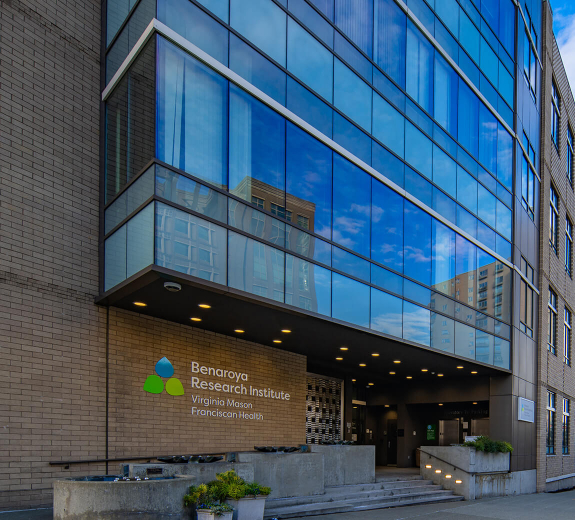Discovery opens door to drugs that could stop breast cancer tumors from growing and spreading – potentially saving women’s lives worldwide
Scientists at the Benaroya Research Institute at Virginia Mason (BRI) have made a discovery that opens the door to a potentially game-changing way to stop breast cancer tumors from growing and spreading.
The researchers – Emma L. Kuan, PhD, and Steven F. Ziegler, PhD – pinpointed how a protein called thymic stromal lymphopoietin (TSLP) helps breast cancer tumors survive and grow. Even more significant, the researchers showed that blocking TSLP in model systems can significantly inhibit the growth of breast tumors and halt metastasis to the lungs. The study was published in the latest issue of Nature Immunology.
"Breast cancer becomes especially dangerous once it spreads to other parts of the body," Dr. Kuan says. "Our work suggests that blocking TSLP could prevent this from happening and potentially save the lives of women worldwide."
How TSLP helps tumors
Researchers had previously found elevated TSLP levels in many different types of tumors, but its role in tumor biology was unclear. Drs. Kuan and Ziegler solved this mystery by using preclinical models to investigate what happens to breast cancer tumors when TSLP is taken away.
Their research revealed that the tumors didn’t grow nearly as large – or metastasize nearly as much – when they didn’t have access to TSLP. Breast cancer cells also died at a much higher rate in tumors without TSLP, compared to tumors where TSLP was present.
"The tumors can get started without TSLP, but they need it in order to keep growing and metastasize through the body," Dr. Ziegler says.
Hijacking immune cells
Once the researchers determined that TSLP was critical, they set out to uncover how it worked – and became the first to discover that tumors turn immune cells into accomplices that express TSLP. The tumors do this by expressing another factor, called IL-1a that draws immune cells into the tumor and induces them to produce TSLP. This TSLP is essential to the survival of the tumor, because it induces the tumor cells to express another protein called BCL-2. This protein protects the tumors from death.
Importantly, the researchers found that the same cells that make TSLP in the models also make TSLP in human breast cancer patients, and human breast tumor cells respond to TSLP in the same way.
"BCL-2 is like a magic potion that keeps cancer cells alive when they’re supposed to die," Dr. Ziegler says. "To brew up that potion, the tumors need TSLP from an outside source – so they enlist specialized cells, attracted to the tumor by IL-1a, to make it for them."
Stopping tumor growth
When Drs. Kuan and Ziegler used an antibody to block TSLP, it stopped tumors in their tracks – even when they had already started growing. Within two weeks, the tumors had shrunk significantly, more of their cells were dying and they had stopped spreading to the lungs. This suggests that anti-TSLP therapy could work in human patients with existing tumors.
"Blocking TSLP could potentially contain not just breast cancer, but many other tumors that have elevated TSLP – including pancreatic cancer, cervical cancer and multiple myeloma," Dr. Kuan says.
Clinical trials of this strategy could be launched for cancer patients in the relatively near future. A drug that blocks TSLP has already been developed, and initial trials have shown that it’s safe in patients with asthma.
"We’re currently working on a better way to block only the TSLP that helps tumors," Dr. Kuan says. "and we are really hopeful that this could become a viable strategy for containing tumors long-term, without interfering with TSLP in other healthy cells."
TSLP: From allergic disease to cancer
TSLP is a novel cytokine that the Ziegler Lab first showed is involved in initiating the inflammatory cascade that leads to the development of asthma and other allergic disease. It is normally expressed in epithelial cells at barrier surfaces in the lungs, skin and gut. When it was shown that increased TSLP is found in breast and pancreatic tumors, and that increased levels are correlated with negative patient outcome, the laboratory began investigating TSLP in cancer models.



